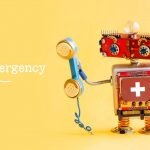 When we think of automation in healthcare, it’s likely that our minds turn to things such as the work DeepMind have been doing to find needles in the proverbial haystack of health data.
When we think of automation in healthcare, it’s likely that our minds turn to things such as the work DeepMind have been doing to find needles in the proverbial haystack of health data.
A recent paper from the Los Angeles Biomedical Research Institute at Harbor-UCLA Medical Center reminds us that there are less sexy technologies that can be beneficial too. It describes the use of automated reminder services used to improve screening for diabetic eye disease.
Loss of vision is common in adults with diabetes, but it’s an outcome that is often preventable with regular eye examinations. These examinations often fail to occur however, especially among poorer sections of society.
“Retinal screening can detect signs of diabetic eye disease such as diabetic retinopathy before vision loss occurs and progresses to blindness,” the authors explain. “Yet screening rates for diabetic retinopathy are low in low-income, minority patients.”
Improving access
The challenge was emphasized by previous work by the researchers that revealed that African Americans would have half the number of retinal screenings as their Latino peers, despite physicians urging them to do so.
The team wanted to test whether telephone reminders would improve matters. They set up a number of automated reminders to encourage patients to attend appointments already scheduled with their doctor to get retinal photos taken.
The participants were divided into a group who received a pre-recorded automated call, and another control group who did not. Everything else about their care was identical. The team then monitored the attendance rate of each cohort.
The data showed that the usual attendance rate was 46.3%, but those who received the reminder phone calls had an attendance rate of nearly 60%. What’s more, among the African American community, this leap was from just 23.6% to 51.6%.
“Robocalls, a relatively low-cost approach to reminder calls, may not only improve diabetic retinopathy screening rates in low-income minority patients with diabetes but also appears to correct the disparity in retinal screening observed among African Americans in this community,” the authors say.
The benefit of reminders
Suffice to say, such reminders don’t need to be delivered via robocalls. For instance, back in 2015 I explored a similar study looking into the use of SMS for various health outcomes.
The research, which was published in the Annual Review of Public Health, found that interventions sent via text message were very effective for areas such as diabetes, weight loss, smoking cessation and physical activity.
The study explored 228 text message intervention studies that covered health promotion, disease self-management and disease prevention.
Around 1/3 of the reviews discovered a significant positive impact on the health outcomes for patients in the studies, across areas such as weight loss and smoking cessation.
It can be tempting to think of technological innovation in healthcare as only being about the high-end areas such as AI and robotics, but the industry is such that some seemingly low-tech innovations can also make a big impact.